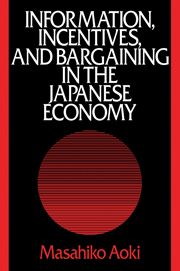 Information, Incentives and Bargaining in the Japanese Economy
Information, Incentives and Bargaining in the Japanese Economy Published online by Cambridge University Press: 14 January 2010
So far I have treated the human resources and the financial resources of the J-firm separately. I have also emphasized the competitive aspect of individual incentives and the possible conflict of interests between different types of stockholders. In this chapter, I deal with the collective interests of quasi-permanent employees and stockholders and analyze the way they interact at the J-firm with the mediation of management. It is assumed that various interests of quasi-permanent employees are aggregated and represented by the enterprise-based union. The possible deviation from share price maximization on behalf of the bank stockholder may be regarded as the agency fee that individual stockholders pay the bank for its monitoring function, although I do not deal with this cost explicitly here. I assume that the body of stockholders is interested in share price maximization.
These two bodies are considered to be integral elements of the J-firm. The efficiency of the decentralized micro-micro information structure of the J-firm as discussed in Chapter 2 depends on the information-processing capabilities of the quasi-permanent employees who participate in it; and information that is generated, processed, and developed within the structure is accumulated and shared among them. They even contribute to a nonnegligible portion of the capital of the J-firm in the form of the accumulated claims for separation payment and future seniority premiums. On the other hand, the body of stockholders contributes an increasing amount of equity capital to the J-firm that is transformed into physical assets that are not readily malleable.
To save this book to your Kindle, first ensure [email protected] is added to your Approved Personal Document E-mail List under your Personal Document Settings on the Manage Your Content and Devices page of your Amazon account. Then enter the ‘name’ part of your Kindle email address below. Find out more about saving to your Kindle.
Note you can select to save to either the @free.kindle.com or @kindle.com variations. ‘@free.kindle.com’ emails are free but can only be saved to your device when it is connected to wi-fi. ‘@kindle.com’ emails can be delivered even when you are not connected to wi-fi, but note that service fees apply.
Find out more about the Kindle Personal Document Service.
To save content items to your account, please confirm that you agree to abide by our usage policies. If this is the first time you use this feature, you will be asked to authorise Cambridge Core to connect with your account. Find out more about saving content to Dropbox.
To save content items to your account, please confirm that you agree to abide by our usage policies. If this is the first time you use this feature, you will be asked to authorise Cambridge Core to connect with your account. Find out more about saving content to Google Drive.